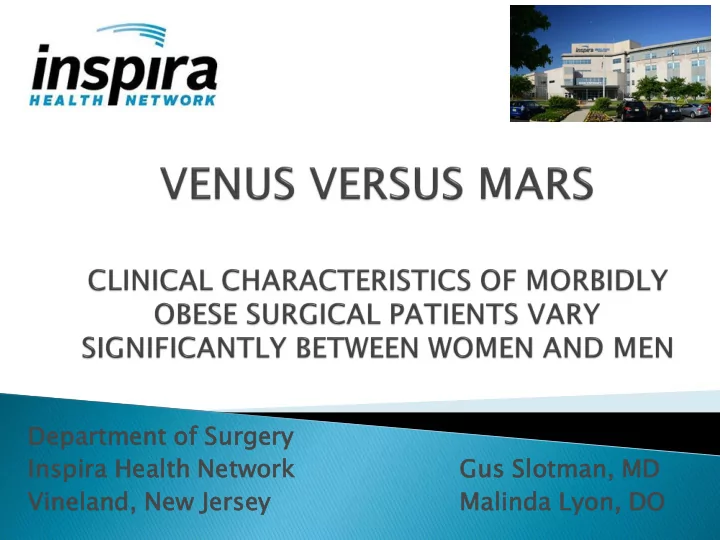

Departmen artment t of Surgery gery Inspira ira Health th Network ork Gus Slot otma man, , MD Vinelan land, , New Jersey ey Malinda inda Lyon, on, DO
None ◦ We regret to report that no profit was made from this research
The obesity epidemic requires every surgeon to manage morbidly obese patients Every insight helps optimize care of these medically fragile individuals Variation by sex in weight-related conditions is not well-defined The objective of this study was to identify clinical differences between obese women and men pre-operatively for sleeve gastrectomy
Data from 8,966 patients in the Surgical Review Corporation’s BOLD database who were about to undergo sleeve gastrectomy Analyzed in two groups: Females (n=6685) and Males (n=2281) ANOVA compared age, weight, and Body Mass Index (BMI) Chi-squared assessed dichotomous variable distribution
180 160 140 120 100 80 Male 60 40 Female 20 (p<0.0001) 0
Female le Caucasian Male 78/74% African- American 6/12% Hispanic 10.3/8.8% (p<0.0001)
80 70 60 50 Male 40 Female 30 (p<0.0001) 20 10 0 Medicaid Medicare Private
70 60 50 40 Male 30 Female 20 (p<0.0001) 10 0
50 45 40 35 30 25 Male 20 15 Female 10 (p<0.0001) 5 0
40 35 30 25 20 Male 15 10 Female 5 (p<0.0001)* 0 *tobacco p<0.05
70 60 50 40 30 Male 20 Female 10 (p<0.0001) 0
50 45 40 35 30 25 20 15 Male 10 5 Female 0 (p<0.0001)
Men ◦ Older ◦ Heavier ◦ Smoked and drank more ◦ Carried more co-morbidities Especially with functional disability and serious cardio- pulmonary/endocrine/metabolic issues Women ◦ Cholelithiasis ◦ GERD ◦ Neuro/psychological problems
Advance knowledge gives surgeons heightened index of suspicion for obese patients These results are from a self-selected population but still may be representative of morbidly obese surgical patients Can improve operative outcomes in morbidly obese patients
Recommend
More recommend